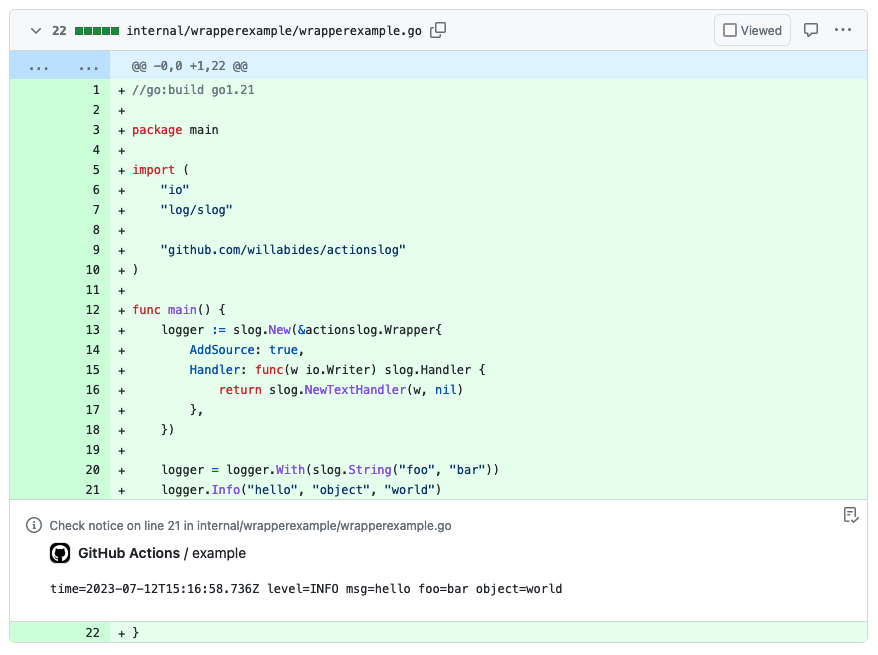Writing a Slog Handler Part 1: The Wrapper
An introduction to Go's log/slog package. Writing a wrapper for a slog.Handler that we can use in GitHub Actions.
Go 1.21 adds log/slog to the standard library. Its primary feature is structured logging similar to zap or logrus. It also adds log levels so you don't need a separate debug logger anymore.
I happened to be working on a GitHub action when the go1.21rc2 announcement
prompted me to explore slog. I wanted to make it output logs formatted for
GitHub Actions. Specifically, This meant
emitting workflow commands
for each log level, so that log.Info() appears as a notice, log.Warn() as a
warning, and so on. It should also link logs to the line that produced them.
I ended up writing both a wrapper that will decorate any handler's output as a workflow command and a handler that formats log entries in human-readable format. Neither one necessarily requires the other, but they work well together if you want human-readable output in your GitHub Actions.
The Wrapper
See the final result on go.pkg.dev.
I started with a wrapper around another handler. It doesn't worry about formatting, it just takes the output of the wrapped handler and decorates it as a workflow command. The wrapper is itself a Handler, so you use it like any other.
This screenshot captures the essence of the wrapper in action. It shows a pull
request with a source code annotation containing the output
from slog.TextHandler.

At first this seemed trivially easy. The Handle method was less than 30 lines of straight-forward code:
type Wrapper struct {
handler slog.Handler
writer io.Writer
}
func (w *Wrapper) Handle(ctx context.Context, record slog.Record) error {
line := "::debug"
switch {
case record.Level >= slog.LevelError:
line = "::error"
case record.Level >= slog.LevelWarn:
line = "::warning"
case record.Level >= slog.LevelInfo:
line = "::notice"
}
if record.PC != 0 {
frames := runtime.CallersFrames([]uintptr{record.PC})
frame, _ := frames.Next()
line += " file=" + frame.File + ",line=" + strconv.Itoa(frame.Line)
}
line += "::"
_, err := io.WriteString(w.writer, line)
if err != nil {
return err
}
err = w.handler.Handle(ctx, record)
if err != nil {
return err
}
_, err = w.writer.Write([]byte{'\n'})
return err
}
This concise code lasted until I wrote a test for concurrent writes. The attentive reader probably already sees the problem. There are three different writes for each line, and concurrent writes will interleave the output.
The obvious solution to this is to use a mutex to guard against concurrent
writes. That would work until handler.WithAttrs() or handler.WithGroup() is
called, but then you end up with multiple handlers writing to the same writer
that will have concurrency issues.
I ended up adding a pointer to root wrapper so that all wrappers created
with the With*() methods can share the same mutex. I also added a buf
field that the wrapped handler writes to instead of writing directly to the
output allowing it to be written with a single Write().
Now Handle() looks like this:
type Wrapper struct {
handler slog.Handler
writer io.Writer
linkSource bool
mu sync.Mutex
buf *[]byte
rootWrapper *Wrapper
}
func (w *Wrapper) root() *Wrapper {
if w.rootWrapper == nil {
return w
}
return w.rootWrapper
}
func (w *Wrapper) Handle(ctx context.Context, record slog.Record) error {
// ... build line same as before ...
root := w.root()
root.mu.Lock()
defer root.mu.Unlock()
if root.buf == nil {
b := make([]byte, 0, 1024)
root.buf = &b
}
*root.buf = (*root.buf)[:0]
*root.buf = append(*root.buf, line...)
err := w.handler.Handle(ctx, record)
if err != nil {
return err
}
*root.buf = append(*root.buf, '\n')
_, err = w.writer.Write(*root.buf)
return err
}
The rest of the methods are pretty simple:
func (w *Wrapper) Enabled(ctx context.Context, level slog.Level) bool {
return w.handler.Enabled(ctx, level)
}
func (w *Wrapper) WithAttrs(attrs []slog.Attr) slog.Handler {
return &Wrapper{
handler: w.handler.WithAttrs(attrs),
writer: w.writer,
linkSource: w.linkSource,
rootWrapper: w.root(),
}
}
func (w *Wrapper) WithGroup(name string) slog.Handler {
return &Wrapper{
handler: w.handler.WithGroup(name),
writer: w.writer,
linkSource: w.linkSource,
rootWrapper: w.root(),
}
}
Now we have a working wrapper. I spared you some of the trivial implementation details, but this is essentially the same as actionslog.Wrapper.
Part 2 - The Handler continues exploring "log/slog" by writing a human-readable handler.